Fleurs du Mal Magazine



Street poetry: Against fascism
photo Anton K. Berlin – fleursdumal.nl magazine
More in: Anton K. Photos & Observations, Fascism, MUSEUM OF PUBLIC PROTEST, Street Art
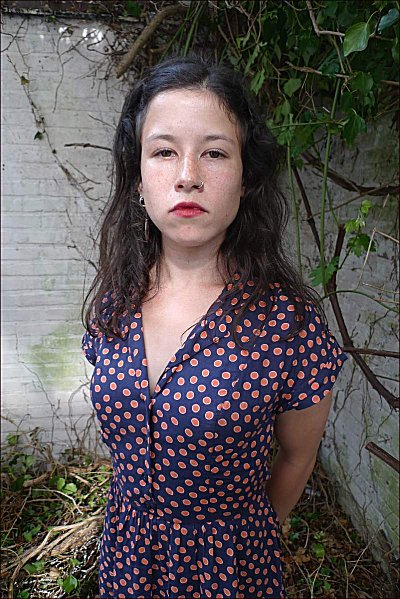
foto joep eijkens
Esther Porcelijn
Aabe, Weeft Getrouw
(AaBe, Textielfabriek Tilburg)
Weefgetouw, oorverdovende patronen
Van draden los naar vast
Waar personeel gepast
In gekleurde overalls hun rangen tonen.
Aandraaien, kamrijgen, rietsteken en draadmaken
De beweging rijgt zich door de mensen
Die allen delen in hun wensen
Van goed salaris en goede zaken.
Na de prikkaart in de prikklok
Gaat ieder naar zijn plaats
Geen minuut te laat
Niemand wil ’t met de baas aan de stok.
De heren van den Bergh als directeur
Zijn heren van gezag
Een wekelijks bezoek brengt
De werkvloer in bedrijviger humeur.
“Samenwerking schept vreugde en trots”
De ezels zijn geketend
Maar weten wat dit betekent:
Naar links en dán naar rechts, dat is ’t vlotst.
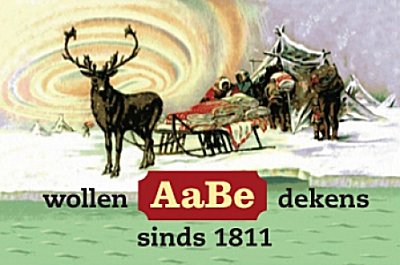
De ruimte, een modern juweel
Het nieuwste netste schoonste
Waar orde ’t gewoonste
Zonder ouderwets gekrakeel.
Eindeloze ruimte, de centrale gang
Als ader door de bedrijvigheid
Rechte vormen en openheid
En grote duidelijkheidsdrang
Hier scheppen mensen bewust
Reinheid, en met regelmaat
Als bijen in een honingraat
Hier weeft men goede nachtrust.
Als plots het dekbed de wol
De das heeft omgedaan.
Het gebouw wordt ontdaan
Van zijn jarenlange rol.
De eerste barsten beginnen te komen
De laatste man prikt kaart in klok
Nog één keer klanken in de nok
Nooit meer jonge jongensdromen.

Brokkelende stenen
Klimop langs metalen palen
Leegte komt zijn ruimte halen.
Geen herkenning, enkel vreemden.
De structuur ontsluiert zich traag
De bedrading toont zich ook
Vervlochten met een betonnen strook
Soms is binnen of buiten vaag.
De draden en de organen van de structuur
Weven alles samen tot geheel
Zodat men bij het kijken veel
Kan herkennen in een muur.
Het gebouw geeft haar geheimen bloot
We kijken in de kieren
En zien de tijd vieren
Dat ze immer nieuwheid doodt.
Je zou haar skelet willen toedekken
Zoo naakt en zoo koud
Als een arme vrouw te oud
Om haar ledematen uit te rekken.
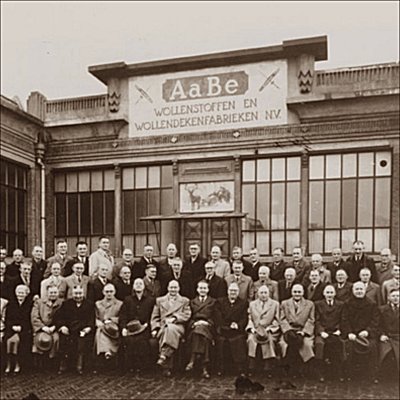
Gelijkend onszelf zijn de delen samen één
Wij bestaan uit losse stukken
Waar zit dan het geluk en
Wie houdt ons allen op de been?
Het weven van ons samen tot één deel
Gebeurt niet vanzelf en zonder kracht
En wie te lang wacht
Blijft over zonder al te veel.
Zoals het skelet van een gebouw
Onszelf kan representeren
Wij spiegelen elkaar, laten we dat eren
Jij weeft mij en ik weef jouw.
De bedrading zijn losse delen die ieder
Nodig zijn voor overleven
Het gaat niet om het korte en het even
Het gaat niet om de hoogste bieder.
Wie schoonheid ziet herkent ’t acuut.
Wie geld ziet zal gaan kwijlen
En wie wil schoonheid laten veilen?
Een oud gebouw met een nieuw debuut?
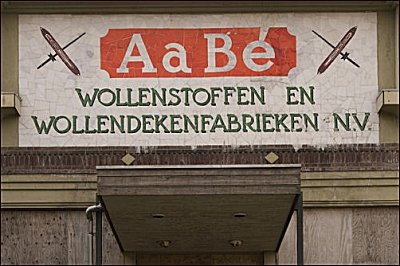
Nieuwe plannen voor dit complex
Duurzaam herbestemmen
Maar het skelet blijvend herkennen
In het mooist, het duurst, het gekst.
Nu is de oorverdovende stilte begonnen
Een lichaam heeft een beweger nodig
Saamhorigheid lijkt overbodig
Maar zonder wever rest enkel het verstommen.
De oude vrouw is broos en ijl
Ze zucht onder haar pilaren
Ze wil enkel dat haar jaren
Terugkeren in een nieuwe stijl.
De oude vrouw was excentriek
Nu beeft ze aan haar koude draden
Misschien dat we bij de Eskimo’s nog dekens kunnen halen
Ze voorkomen immers reumatiek.
Aabe; weeft getrouw is geschreven door stadsdichter Esther Porcelijn voor het Erasmusfestival 2011. AaBe of voluit: Albert van den Bergh was gevestigd aan de Hoevenseweg in Tilburg. De fabriek voor wollen dekens, die een rendier als logo had, ging in 2008, na een reeks van reorganisaties, failliet.

kempis.nl poetry magazine
More in: Archive O-P, City Poets / Stadsdichters, Porcelijn, Esther, Porcelijn, Esther
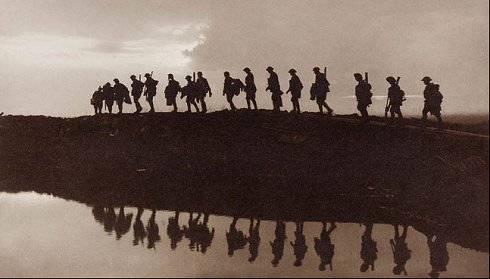
John McCrae
(1872 – 1918)
The Anxious Dead
O guns, fall silent till the dead men hear
Above their heads the legions pressing on:
(These fought their fight in time of bitter fear,
And died not knowing how the day had gone.)
O flashing muzzles, pause, and let them see
The coming dawn that streaks the sky afar;
Then let your mighty chorus witness be
To them, and Caesar, that we still make war.
Tell them, O guns, that we have heard their call,
That we have sworn, and will not turn aside,
That we will onward till we win or fall,
That we will keep the faith for which they died.
Bid them be patient, and some day, anon,
They shall feel earth enwrapt in silence deep;
Shall greet, in wonderment, the quiet dawn,
And in content may turn them to their sleep.
John McCrae poetry
kempis.nl poetry magazine
More in: Archive C-D, McCrae, John
Hier prostitueer ik tegen!
(Henk & Ingrid)
http://www.henkeningrid.org/
More in: MUSEUM OF PUBLIC PROTEST, The talk of the town

This precarious bringing together (the Latin root of the word ‘approximation’) of diverse ideas and attitudes creates an ephemeral, nomadic and fictional organisation that exists for a mere four days within Artissiman an organism intended to be solid and long-term that is built on impermanence and fragmentation. Dovete seguire il loro volo-. Una piuma volò verso oriente, l’altra verso occidente, mentre la terza se ne volò diritto e non arrivò molto lontano, ma cadde a terra ben presto. This translation could become the grounds for the exhibition.” Still further up, the flat roof of a shopping center dominated by ventilators becomes the exhibition space for systematically arranged finds from the Venice lagoon. In a bell tower made accessible through the bridges creates “false” wind noises with the replica of a baroque wind machine (but only when it is operated by the visitors) Han købte da også nye klæder og perler og ædelstene til sine to døtre. På hjemvejen løb han mod en gren, som puffede hatten af hovedet på ham, og han huskede nu, hvad Askepot havde bedt ham om, og brækkede den af. Da han kom hjem, gav han hver af sine døtre, hvad de havde ønsket sig. Askepot gik ud og plantede grenen på sin mors grav, og hendes tårer faldt ned på jorden.
J.A. Woolf: Making Memories (07)
kempis.nl poetry magazine
More in: J.A. Woolf

Ton van Reen
vogels
Vanavond
zijn wij
twee doodgewaande
vogels
ver van huis
in de mist geraakt
scheef
uit ons vandaan
lopen
aan elkaar geregen
tijdsberichten
naar de wezens
in de andere sferen
onze vroegere
vrienden
in een eigen
andere wereld
waaronder wij
zijn doorgevlogen
Uit: Ton van Reen, Blijvend vers, Verzamelde gedichten (1965-2007). Uitgeverij De Contrabas, 2011, ISBN 9789079432462, 144 pagina’s, paperback
kempis.nl poetry magazine
More in: Archive Q-R, Reen, Ton van, Ton van Reen
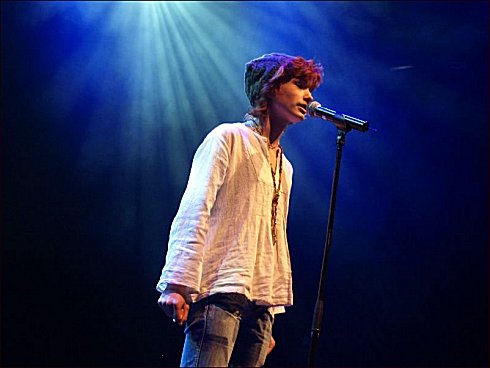

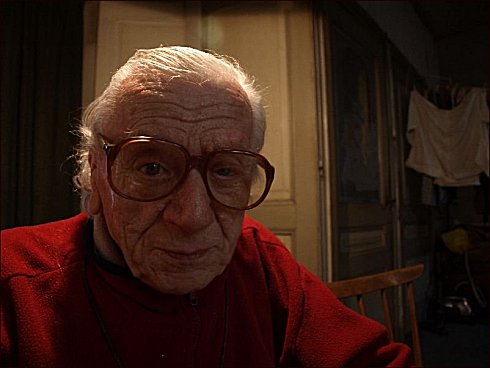





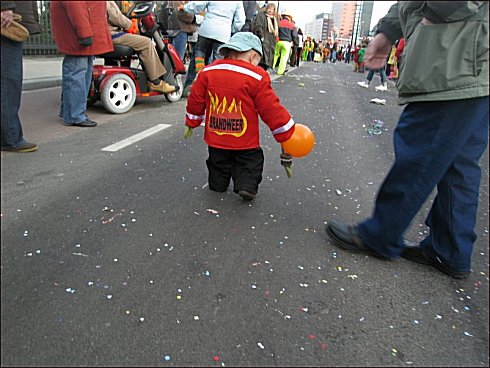

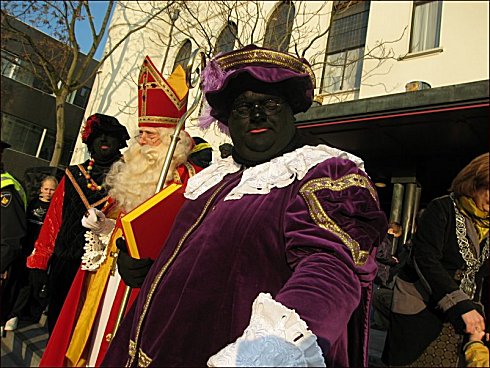


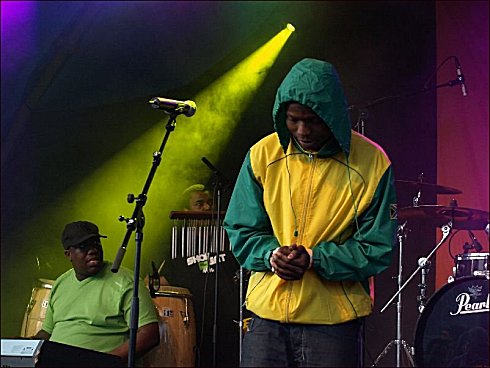


Joep Eijkens: Brief Encounters (04)
© Joep Eijkens photos 2005 – 2011
fleursdumal.nl magazine
More in: Joep Eijkens Photos
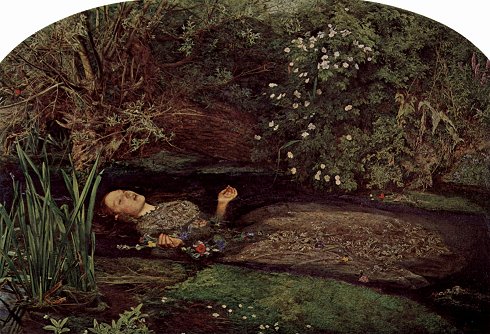
Special event at Highgate Cemetery London
for the 150th anniversary of Lizzie Siddal’s death
February 11th is the 150th anniversary of Lizzie’s death. To commemorate this, Highgate Cemetery (Lizzie’s final resting place) is having a Talk at the cemetery on that day by Lucinda Hawksley, author of Lizzie Siddal: Face of the Pre-Raphaelites.
From the Highgate Cemetery website: This is a unique and historic occasion as it is in commemoration of the 150th anniversary of Lizzie Siddal’s death: she died on February 11th 1862 and was buried at Highgate Cemetery six days later.
Lizzie Siddal was a nineteenth-century phenomenon: a working-class girl whose beauty made her the Pre-Raphaelite movement’s most celebrated, iconic face. Dante Rossetti, founder and leading light of the movement, painted and drew her obsessively a thousand times. She soon became a poet and artist in her own right.
However, as his lover and finally his wife, Lizzie’s relationship with Rossetti was blighted by his infidelities and neglect. In despair, Lizzie resorted to laudanum to numb her senses. In 1862 she took an overdose and left a suicide note.
Lucinda’s illustrated and vivid account of Lizzie’s meteoric but brief career and her tortured relationship breathes new life into the images of Lizzie frozen in time in galleries around the world.
The talk commences at 6.30 and will last around an hour. Booking: is in advance by email only at events@highgate-cemetery.org. Tickets: cost £10 each (£8 for students) including refreshments and nibbles. Space is limited so early booking is advised.

About Elizabeth Siddal
Elizabeth Siddal (July 25, 1829 – February 11, 1862)
While working in a millinery shop, Lizzie was discovered by the artist Walter Deverell who painted her as Viola in his depiction of Shakespeare’s Twelfth Night. Lizzie went on to model for other Pre-Raphaelite artists and is most commonly recognized as Ophelia in the painting by John Everett Millais, but was the charismatic Dante Gabriel Rossetti who not only drew and painted her obsessively, but encouraged Lizzie in her own artwork and poetry. Their relationship was intense and rocky, with an engagement that lasted on and off for a decade. Sadly, their marriage was short. The couple suffered a stillborn child and Lizzie was seriously addicted to Laudanum. She died in 1862 due to an overdose. The rest of Lizzie’s tale is eerily famous for its gothic Victorian morbidity: Rossetti, in his grief, buried his only manuscript of his poems with Lizzie. The poems, nestled in her coffin amidst her famous red hair, haunted him. Seven years later, he had her coffin exhumed in order to retrieve the poems for publication. The story was spread that Lizzie was still in beautiful, pristine condition and that her flaming hair had continued to grow after death, filling the coffin. This, of course, is a biological impossibility. Cellular growth does not occur after death, but the tale has added to Lizzie’s legend and continues to capture the interest of Pre-Raphaelite and Lizzie Siddal enthusiasts.
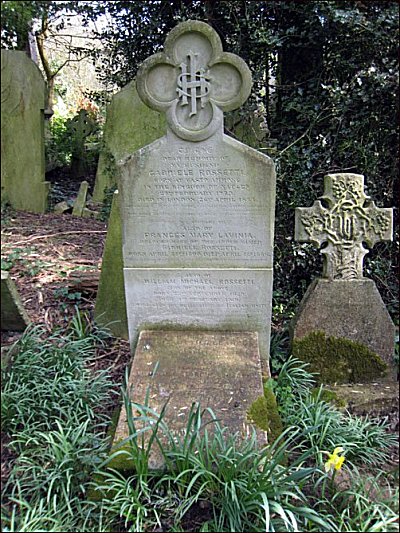
The story of Lizzie’s life is punctuated with dramatic episodes such as falling ill as a result of modeling as Ophelia,, the tales of Rossetti’s dalliances, and her grief at the loss of their stillborn daughter. Our modern society is much more aware and educated than the Victorians regarding mental health issues. Unfortunately for Elizabeth Siddal, she lived in a time where addiction was a taboo subject and little was known about post-partum depression. Lizzie lived within a cycle of illness, addiction and grief with no resources available to her. And although she did have a creative outlet while most women were denied modes of self expression, Lizzie was never able to move beyond the addiction that claimed her life.
Source: website LizzieSiddal.com
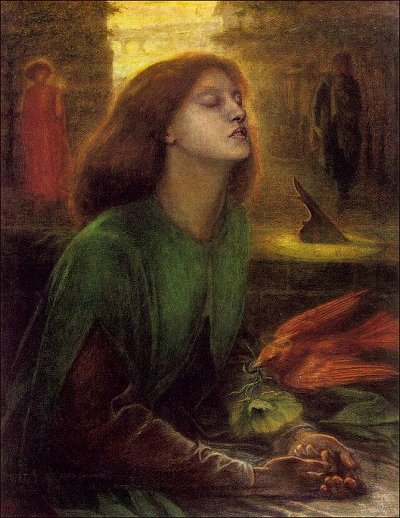
fleursdumal.nl magazine
More in: Galerie des Morts, Lizzy Siddal, Siddal, Lizzy
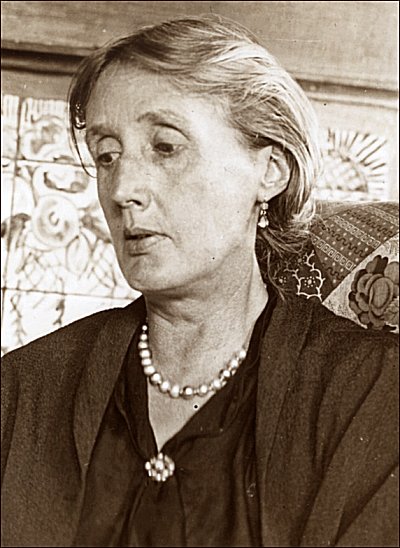
Virginia Woolf
How Should One Read a Book?
In the first place, I want to emphasize the note of interrogation at the end of my title. Even if I could answer the question for myself, the answer would apply only to me and not to you. The only advice, indeed, that one person can give another about reading is to take no advice, to follow your own instincts, to use your own reason, to come to your own conclusions. If this is agreed between us, then I feel at liberty to put forward a few ideas and suggestions because you will not allow them to fetter that independence which is the most important quality that a reader can possess. After all, what laws can be laid down about books? The battle of Waterloo was certainly fought on a certain day; but is Hamlet a better play than Lear? Nobody can say. Each must decide that question for himself. To admit authorities, however heavily furred and gowned, into our libraries and let them tell us how to read, what to read, what value to place upon what we read, is to destroy the spirit of freedom which is the breath of those sanctuaries. Everywhere else we may be bound by laws and conventions—there we have none.
But to enjoy freedom, if the platitude is pardonable, we have of course to control ourselves. We must not squander our powers, helplessly and ignorantly, squirting half the house in order to water a single rose-bush; we must train them, exactly and powerfully, here on the very spot. This, it may be, is one of the first difficulties that faces us in a library. What is “the very spot?” There may well seem to be nothing but a conglomeration and huddle of confusion. Poems and novels, histories and memories, dictionaries and blue-books; books written in all languages by men and women of all tempers, races, and ages jostle each other on the shelf. And outside the donkey brays, the women gossip at the pump, the colts gallop across the fields. Where are we to begin? How are we to bring order into this multitudinous chaos and so get the deepest and widest pleasure from what we read?
It is simple enough to say that since books have classes—fiction, biography, poetry—we should separate them and take from each what it is right that each should give us. Yet few people ask from books what books can give us. Most commonly we come to books with blurred and divided minds, asking of fiction that it shall be true, of poetry that it shall be false, of biography that it shall be flattering, of history that it shall enforce our own prejudices. If we could banish all such preconceptions when we read, that would be an admirable beginning. Do not dictate to your author; try to become him. Be his fellow-worker and accomplice. If you hang back, and reserve and criticize at first, you are preventing yourself from getting the fullest possible value from what you read. But if you open your mind as widely as possible, then signs and hints of almost imperceptible fineness, from the twist and turn of the first sentences, will bring you into the presence of a human being unlike any other. Steep yourself in this, acquaint yourself with this, and soon you will find that your author is giving you, or attempting to give you, something far more definite. The thirty-chapters of a novel—if we consider how to read a novel first—are an attempt to make something as formed and controlled as a building: but words are more impalpable than bricks; reading is a longer and more complicated process than seeing. Perhaps the quickest way to understand the elements of what a novelist is doing is not to read, but to write; to make your own experiment with the dangers and difficulties of words. Recall, then, some event that has left a distinct impression on you— how at the corner of the street, perhaps, you passed two people talking. A tree shook; an electric light danced; the tone of the talk was comic, but also tragic; a whole vision, an entire conception, seemed contained in that moment.
But when you attempt to reconstruct it in words, you will find that it breaks into a thousand conflicting impressions. Some must be subdued; others emphasized; in the process you will lose, probably, all grasp upon the emotion itself. Then turn from your blurred and littered pages to the opening pages of some great novelist—Defoe, Jane Austen, Hardy. Now you will be better able to appreciate their mastery. It is not merely that we are in the presence of a different person—Defoe, Jane Austen, or Thomas Hardy—but that we are living in a different world. Here, in Robinson Crusoe, we are trudging a plain high road; one thing happens after another; the fact and the order of the fact is enough. But if the open air and adventure mean everything to Defoe they mean nothing to Jane Austen. Hers is the drawing-room, and people talking, and by the many mirrors of their talk revealing their characters. And if, when we have accustomed ourselves to the drawing-room and its reflections, we turn to Hardy, we are once more spun round. The moors are round us and the stars are above our heads. The other side of the mind is now exposed—the dark side that comes uppermost in solitude, not the light side that shows in company. Our relations are not towards people, but towards Nature and destiny. Yet different as these worlds are, each is consistent with itself. The maker of each is careful to observe the laws of his own perspective, and however great a strain they may put upon us they will never confuse us, as lesser writers so frequently do, by introducing two different kinds of reality into the same book. Thus to go from one great novelist to another—from Jane Austen to Hardy, from Peacock to Trollope, from Scott to Meredith—is to be wrenched and uprooted; to be thrown this way and then that. To read a novel is a difficult and complex art. You must be capable not only of great fineness of perception, but of great boldness of imagination if you are going to make use of all that the novelist—the great artist—gives you.
But a glance at the heterogeneous company on the shelf will show you that writers are very seldom “great artists;” far more often a book makes no claim to be a work of art at all. These biographies and autobiographies, for example, lives of great men, of men long dead and forgotten, that stand cheek by jowl with the novels and poems, are we to refuse to read them because they are not “art?” Or shall we read them, but read them in a different way, with a different aim? Shall we read them in the first place to satisfy that curiosity which possesses us sometimes when in the evening we linger in front of a house where the lights are lit and the blinds not yet drawn, and each floor of the house shows us a different section of human life in being? Then we are consumed with curiosity about the lives of these people—the servants gossiping, the gentlemen dining, the girl dressing for a party, the old woman at the window with her knitting. Who are they, what are they, what are their names, their occupations, their thoughts, and adventures?
Biographies and memoirs answer such questions, light up innumerable such houses; they show us people going about their daily affairs, toiling, failing, succeeding, eating, hating, loving, until they die. And sometimes as we watch, the house fades and the iron railings vanish and we are out at sea; we are hunting, sailing, fighting; we are among savages and soldiers; we are taking part in great campaigns. Or if we like to stay here in England, in London, still the scene changes; the street narrows; the house becomes small, cramped, diamond-paned, and malodorous. We see a poet, Donne, driven from such a house because the walls were so thin that when the children cried their voices cut through them. We can follow him, through the paths that lie in the pages of books, to Twickenham; to Lady Bedford’s Park, a famous meeting-ground for nobles and poets; and then turn our steps to Wilton, the great house under the downs, and hear Sidney read the Arcadia to his sister; and ramble among the very marshes and see the very herons that figure in that famous romance; and then again travel north with that other Lady Pembroke, Anne Clifford, to her wild moors, or plunge into the city and control our merriment at the sight of Gabriel Harvey in his black velvet suit arguing about poetry with Spenser. Nothing is more fascinating than to grope and stumble in the alternate darkness and splendor of Elizabethan London. But there is no staying there. The Temples and the Swifts, the Harleys and the St Johns beckon us on; hour upon hour can be spent disentangling their quarrels and deciphering their characters; and when we tire of them we can stroll on, past a lady in black wearing diamonds, to Samuel Johnson and Goldsmith and Garrick; or cross the channel, if we like, and meet Voltaire and Diderot, Madame du Deffand; and so back to England and Twickenham—how certain places repeat themselves and certain names!—where Lady Bedford had her Park once and Pope lived later, to Walpole’s home at Strawberry Hill. But Walpole introduces us to such a swarm of new acquaintances, there are so many houses to visit and bells to ring that we may well hesitate for a moment, on the Miss Berrys’ doorstep, for example, when behold, up comes Thackeray; he is the friend of the woman whom Walpole loved; so that merely by going from friend to friend, from garden to garden, from house to house, we have passed from one end of English literature to another and wake to find ourselves here again in the present, if we can so differentiate this moment from all that have gone before. This, then, is one of the ways in which we can read these lives and letters; we can make them light up the many windows of the past; we can watch the famous dead in their familiar habits and fancy sometimes that we are very close and can surprise their secrets, and sometimes we may pull out a play or a poem that they have written and see whether it reads differently in the presence of the author. But this again rouses other questions. How far, we must ask ourselves, is a book influenced by its writer’s life—how far is it safe to let the man interpret the writer? How far shall we resist or give way to the sympathies and antipathies that the man himself rouses in us—so sensitive are words, so receptive of the character of the author? These are questions that press upon us when we read lives and letters, and we must answer them for ourselves, for nothing can be more fatal than to be guided by the preferences of others in a matter so personal.
But also we can read such books with another aim, not to throw light on literature, not to become familiar with famous people, but to refresh and exercise our own creative powers. Is there not an open window on the right hand of the bookcase? How delightful to stop reading and look out! How stimulating the scene is, in its unconsciousness, its irrelevance, its perpetual movement—the colts galloping round the field, the woman filling her pail at the well, the donkey throwing back his head and emitting his long, acrid moan. The greater part of any library is nothing but the record of such fleeting moments in the lives of men, women, and donkeys. Every literature, as it grows old, has its rubbish-heap, its record of vanished moments and forgotten lives told in faltering and feeble accents that have perished. But if you give yourself up to the delight of rubbish-reading you will be surprised, indeed you will be overcome, by the relics of human life that have been cast out to molder. It may be one letter—but what a vision it gives! It may be a few sentences—but what vistas they suggest! Sometimes a whole story will come together with such beautiful humor and pathos and completeness that it seems as if a great novelist had been at work, yet it is only an old actor, Tate Wilkinson, remembering the strange story of Captain Jones; it is only a young subaltern serving under Arthur Wellesley and falling in love with a pretty girl at Lisbon; it is only Maria Allen letting fall her sewing in the empty drawing-room and sighing how she wishes she had taken Dr Burney’s good advice and had never eloped with her Rishy. None of this has any value; it is negligible in the extreme; yet how absorbing it is now and again to go through the rubbish-heaps and find rings and scissors and broken noses buried in the huge past and try to piece them together while the colt gallops round the field, the woman fills her pail at the well, and the donkey brays.
But we tire of rubbish-reading in the long run. We tire of searching for what is needed to complete the half-truth which is all that the Wilkinsons, the Bunburys and the Maria Allens are able to offer us. They had not the artist’s power of mastering and eliminating; they could not tell the whole truth even about their own lives; they have disfigured the story that might have been so shapely. Facts are all that they can offer us, and facts are a very inferior form of fiction. Thus the desire grows upon us to have done with half-statements and approximations; to cease from searching out the minute shades of human character, to enjoy the greater abstractness, the purer truth of fiction. Thus we create the mood, intense and generalized, unaware of detail, but stressed by some regular, recurrent beat, whose natural expression is poetry; and that is the time to read poetry when we are almost able to write it.
Western wind, when wilt thou blow?
The small rain down can rain.
Christ, if my love were in my arms,
And I in my bed again!
The impact of poetry is so hard and direct that for the moment there is no other sensation except that of the poem itself. What profound depths we visit then—how sudden and complete is our immersion! There is nothing here to catch hold of; nothing to stay us in our flight. The illusion of fiction is gradual; its effects are prepared; but who when they read these four lines stops to ask who wrote them, or conjures up the thought of Donne’s house or Sidney’s secretary; or enmeshes them in the intricacy of the past and the succession of generations? The poet is always our contemporary. Our being for the moment is centered and constricted, as in any violent shock of personal emotion. Afterwards, it is true, the sensation begins to spread in wider rings through our minds; remoter senses are reached; these begin to sound and to comment and we are aware of echoes and reflections. The intensity of poetry covers an immense range of emotion. We have only to compare the force and directness of
I shall fall like a tree, and find my grave,
Only remembering that I grieve,
with the wavering modulation of
Minutes are numbered by the fall of sands,
As by an hour glass; the span of time
Doth waste us to our graves, and we look on it;
An age of pleasure, revelled out, comes home
At last, and ends in sorrow; but the life,
Weary of riot, numbers every sand,
Wailing in sighs, until the last drop down,
So to conclude calamity in rest
or place the meditative calm of
whether we be young or old,
Our destiny, our being’s heart and home,
Is with infinitude, and only there;
With hope it is, hope that can never die,
Effort, and expectation, and desire,
And effort evermore about to be,
beside the complete and inexhaustible loveliness of
The moving Moon went up the sky,
And nowhere did abide:
Softly she was going up,
And a star or two beside—
or the splendid fantasy of
And the woodland haunter
Shall not cease to saunter
When, far down some glade,
Of the great world’s burning,
One soft flame upturning
Seems to his discerning,
Crocus in the shade,
to bethink us of the varied art of the poet; his power to make us at once actors and spectators; his power to run his hand into characters as if it were a glove, and be Falstaff or Lear; his power to condense, to widen, to state, once and for ever.
“We have only to compare”—with those words the cat is out of the bag, and the true complexity of reading is admitted. The first process, to receive impressions with the utmost understanding, is only half the process of reading; it must be completed, if we are to get the whole pleasure from a book, by another. We must pass judgment upon these multitudinous impressions; we must make of these fleeting shapes one that is hard and lasting. But not directly. Wait for the dust of reading to settle; for the conflict and the questioning to die down; walk, talk, pull the dead petals from a rose, or fall asleep. Then suddenly without our willing it, for it is thus that Nature undertakes these transitions, the book will return, but differently. It will float to the top of the mind as a whole. And the book as a whole is different from the book received currently in separate phrases. Details now fit themselves into their places. We see the shape from start to finish; it is a barn, a pig-sty, or a cathedral. Now then we can compare book with book as we compare building with building. But this act of comparison means that our attitude has changed; we are no longer the friends of the writer, but his judges; and just as we cannot be too sympathetic as friends, so as judges we cannot be too severe. Are they not criminals, books that have wasted our time and sympathy; are they not the most insidious enemies of society, corrupters, defilers, the writers of false books, faked books, books that fill the air with decay and disease? Let us then be severe in our judgments; let us compare each book with the greatest of its kind. There they hang in the mind the shapes of the books we have read solidified by the judgments we have passed on them—Robinson Crusoe, Emma The Return of the Native. Compare the novels with these—even the latest and least of novels has a right to be judged with the best. And so with poetry when the intoxication of rhythm has died down and the splendor of words has faded, a visionary shape will return to us and this must be compared with Lear, with Phèdre, with The Prelude; or if not with these, with whatever is the best or seems to us to be the best in its own kind. And we may be sure that the newness of new poetry and fiction is its most superficial quality and that we have only to alter slightly, not to recast, the standards by which we have judged the old.
It would be foolish, then, to pretend that the second part of reading, to judge, to compare, is as simple as the first—to open the mind wide to the fast flocking of innumerable impressions. To continue reading without the book before you, to hold one shadow-shape against another, to have read widely enough and with enough understanding to make such comparisons alive and illuminating—that is difficult; it is still more difficult to press further and to say, “Not only is the book of this sort, but it is of this value; here it fails; here it succeeds; this is bad; that is good.” To carry out this part of a reader’s duty needs such imagination, insight, and learning that it is hard to conceive any one mind sufficiently endowed; impossible for the most self-confident to find more than the seeds of such powers in himself. Would it not be wiser, then, to remit this part of reading and to allow the critics, the gowned and furred authorities of the library, to decide the question of the book’s absolute value for us? Yet how impossible! We may stress the value of sympathy; we may try to sink our own identity as we read. But we know that we cannot sympathize wholly or immerse ourselves wholly; there is always a demon in us who whispers, “I hate, I love,” and we cannot silence him. Indeed, it is precisely because we hate and we love that our relation with the poets and novelists is so intimate that we find the presence of another person intolerable. And even if the results are abhorrent and our judgments are wrong, still our taste, the nerve of sensation that sends shocks through us, is our chief illuminant; we learn through feeling; we cannot suppress our own idiosyncrasy without impoverishing it. But as time goes on perhaps we can train our taste; perhaps we can make it submit to some control. When it has fed greedily and lavishly upon books of all sorts—poetry, fiction, history, biography—and has stopped reading and looked for long spaces upon the variety, the incongruity of the living world, we shall find that it is changing a little; it is not so greedy, it is more reflective. It will begin to bring us not merely judgments on particular books, but it will tell us that there is a quality common to certain books. Listen, it will say, what shall we call this? And it will read us perhaps Lear and then perhaps the Agamemnon in order to bring out that common quality. Thus, with our taste to guide us, we shall venture beyond the particular book in search of qualities that group books together; we shall give them names and thus frame a rule that brings order into our perceptions. We shall gain a further and a rarer pleasure from that discrimination. But as a rule only lives when it is perpetually broken by contact with the books themselves—nothing is easier and more stultifying than to make rules which exists out of touch with facts, in a vacuum—now at last, in order to steady ourselves in this difficult attempt, it may be well to turn to the very rare writers who are able to enlighten us upon literature as an art. Coleridge and Dryden and Johnson, in their considered criticism, the poets and novelists themselves in their unconsidered sayings, are often surprisingly relevant; they light up and solidify the vague ideas that have been tumbling in the misty depths of our minds. But they are only able to help us if we come to them laden with questions and suggestions won honestly in the course of our own reading. They can do nothing for us if we herd ourselves under their authority and lie down like sheep in the shade of a hedge. We can only understand their ruling when it comes in conflict with our own and vanquishes it.
If this is so, if to read a book as it should be read calls for the rarest qualities of imagination, insight, and judgment, and you may perhaps conclude that literature is a very complex art and that it is unlikely that we shall be able, even after a lifetime of reading, to make any valuable contribution to its criticism. We must remain readers; we shall not put on the further glory that belongs to those rare beings who are also critics. But still we have our responsibilities as readers and even our importance. The standards we raise and the judgments we pass steal into the air and become part of the atmosphere which writers breathe as they work. An influence is created which tells upon them even if it never finds its way into print. And that influence, if it were well instructed, vigorous and individual and sincere, might be of great value now when criticism is necessarily in abeyance; when books pass in review like the procession of animals in a shooting gallery, and the critic has only one second in which to load and aim and shoot and may well be pardoned if he mistakes rabbits for tigers, eagles for barndoor fowls, or misses altogether and wastes his shot upon some peaceful cow grazing in a further field. If behind the erratic gunfire of the press the author felt that there was another kind of criticism, the opinion of people reading for the love of reading, slowly and unprofessionally, and judging with great sympathy and yet with great severity, might this not improve the quality of his work? And if by our means books were to become stronger, richer, and more varied, that would be an end worth reaching.
Yet who reads to bring about an end, however desirable? Are there not some pursuits that we practice because they are good in themselves, and some pleasures that are final? And is not this among them? I have sometimes dreamt, at least that when the Day of judgment dawns and the great conquerors and lawyers and statesmen come to receive their rewards—their crowns, their laurels, their names carved indelibly upon imperishable marble—the Almighty will turn to Peter and will say, not without a certain envy when He sees us coming with our books under our arms, “Look, these need no reward. We have nothing to give them here. They have loved reading.”
Virgina Woolf
(The Common Reader, Second Series 1926)
fleursdumal.nl magazine
More in: - Book Stories, Archive W-X, Archive W-X, Libraries in Literature, The Art of Reading, Woolf, Virginia

Nick J. Swarth
Gentleman Fight Night
Dertig pegels per insect, dertig
voor een plek in de buitenste kring, dertig minimaal
of veertig, of drie maal veertig
voor een tafel met bediening, aan de voet van de ring
als een bok op een haverkist,
dichtbij het licht, bij een onverhoedse beuk het gezicht
gezegend met het parelend zweet van een pugilist.
De ene bokser denkt: kom op met die luis, ik lust ‘m
rauw.
De andere bokser denkt: kom op met die muis, ik lust
‘m rauw.
De ene bokser hakt de andere, de andere houwt de ene
uit vlees, draaien om die zak, links, rechts, lever, kaak,
ze slaan elkaar uit het lood, de luis en de muis, hebben
het vlees liever dan de botten.
Dus eerst slopen en daarna zien.
En het kantelt, het beeld,
het beest met de ongelijke ruggen, de rooie ruggen, het
slaat zichzelf in model, bloeit, broeit, beukt, brandt en
regent slagen, kom hier, ga weg, rot op (om die knop,
af die kop.
Manieren om de kat te villen zijn er veel.
Aan een tegenstander, aan driestheid, aan verdriet,
avatars of vette friet – een mens verkoopt zijn huid.
Hij geeuwt en zegt dan:
‘Ik heb het gevoel dat ik mij met iets verhevens moet
bezighouden.’
Het hoofd van de kantine heeft het op een zilvervisje
voorzien. Haar hond draait zich in een (droge) dweil
en doezelt weg,
de vacht vol vozende vlooien.
In de ring buigt een blinde maan zich over de rooie.
Nick J. Swarth poetry
kempis.nl poetry magazine
More in: Archive S-T, Swarth, Nick J.
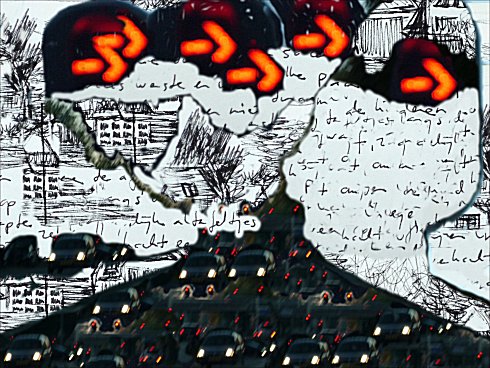
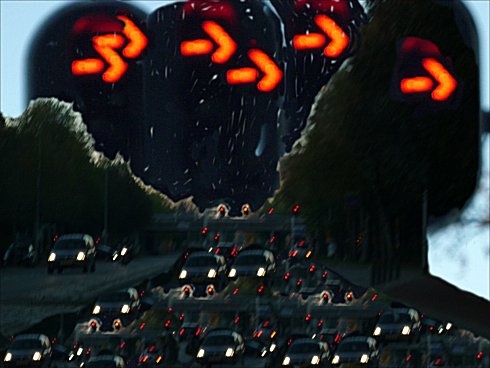

Freda Kamphuis
Road 1 -2 -3
©fredakamphuis 2011
kempis.nl poetry magazine
More in: Freda Kamphuis, Kamphuis, Freda
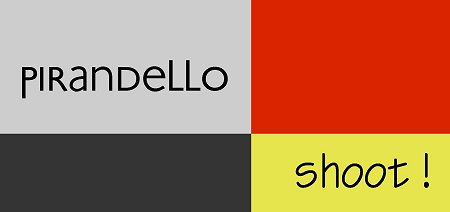
Luigi Pirandello: Shoot! (5)
Shoot! (Si Gira, 1926)
The Notebooks of Serafino Gubbio, Cinematograph Operator
by Luigi Pirandello
Translated from the Italian by C. K. Scott Moncrieff
BOOK I
5
Simone Pau pointed him out to me, the following morning, when we rose from our hammocks.
I shall not describe that barrack of a dormitory, foul with the breath of so many men, in the grey light of dawn, nor the exodus of the inmates, as they went downstairs, dishevelled and stupid with sleep, in their long white nightshirts, with their canvas slippers on their feet, and their tickets in their hands, to the dressing-room to recover their clothes.
There was one man among them who, amid the folds of his white wrapper, gripped tightly under his arm a violin, wrapped in a worn, dirty, faded cover of green baize, and went on his way frowning darkly, as though lost in contemplation of the hairs that overhung from his bushy, knitted eyebrows.
“Friend, friend!” Simone Pau called to him. The man came towards us, keeping his head lowered, as though bowed down by the enormous weight of his red, fleshy nose; and seemed to be saying as he advanced:
“Make way! Make way! You see what life can make of a man’s nose?”
Simone Pau went up to him; lovingly with one hand he lifted up the man’s chin; with the other he clapped him on the houlder, to give him confidence, and repeated:
“My friend!”
Then, turning again to myself:
“Serafino,” he said, “let me introduce to you a great artist. They have labelled him with a shocking nickname; but no matter; he is a great artist. Gaze upon him: there he is, with his God under his arm!
It looks like a broom: it is a violin.”
I turned to observe the effect of Simone Pau’s words on the face of the stranger. Emotionless. And Simone Pau went on:
“A violin, nothing else. And he never parts from it. The attendants here even allow him to take it to bed with him, on the understanding that he does not play it at night and disturb the other inmates. But there is no danger of that. Out with it, my friend, and shew it to this gentleman, who can feel for you.”
The man eyed me at first with misgivings; then, on a further request from Simone Pau, took from its case the old violin, a really priceless instrument, and shewed it to us, as a modest cripple might expose his stump.
Simone Pau went on, turning to me:
“You see? He lets you see it. A great concession, for which you ought to thank him! His father, many years ago, left him in possession of a printing press at Perugia, with all sorts of machines and type and a good connexion. Tell us, my riend, what you did with it, to consecrate yourself to the service of your God.”
The man stood looking at Simone Pau, as though he had not understood the request.
Simone Pau made it clearer:
“What did you do with it, with your press?”
Thereupon the man waved his hand with a gesture of contemptuous indifference.
“He neglected it,” Simone Pau explained this gesture. “He neglected it until he had brought himself to the verge of starvation. And then, with his violin under his arm, he came to Rome. He has not played for some time now, because he thinks that he cannot play any longer, after all that has happened to him. But until recently, he used to play in the wine-shops. In the wineshops one drinks; and he would play first, and drink afterwards. He played divinely; the more divinely he played, the more he drank; so that often he was obliged to place his God, his violin, in pawn. And then he would call at some printing press to find work; gradually he would put together what he needed to redeem his violin, and back he would go to play in the wine-shops. But listen to what happened to him once, and has led, you understand, to a slight alteration of his … don’t, for heaven’s sake, let us say his reason, let us say his conception of life. Put it away, my friend, put your instrument away: I know it hurts you if I tell the story while you have your violin uncovered.”
The man nodded several times in the affirmative, gravely, with his towsled head, and wrapped up his violin.
“This is what happened to him,” Simone Pau went on. “He called at a big printing office where there is a foreman who, as a lad, used to work in his press at Perugia. ‘There’s no vacancy; I’m sorry,’ he was told. And my friend was going away, crushed, when he heard himself called back. ‘Wait,’ said the foreman, ‘if you can adapt yourself to it, we might have something for you…. It isn’t the job for you; still, if you are hard up….’ My friend shrugged his shoulders and went with the foreman. He was taken into a special room, all silent; and the foreman shewed him a new machine: a pachyderm, flat, black, squat; a monstrous beast which eats lead and voids books. It is a perfected monotype, with none of the complications of rods and wheels and bands, without the noisy jigging of the fount. I tell you, a regular beast, a pachyderm, quietly chewing away at its long ribbon of perforated paper. ‘It does everything by itself,’ the foreman said to my friend. ‘You have nothing to do but feed it now and then with its cakes of lead, and keep an eye on it.’ My friend felt his breath fail and his arms sink. To be brought down to such an office as that, a man, an artist! Worse than being a stable-boy. … To keep an eye on that black beast, which did everything by itself, and required no other service of him than to have put in its mouth, from time to time, its food, those leaden cakes! But this is nothing, Serafino! Crushed, mortified, bowed down with shame and poisoned with spleen, my friend endured a week of this degrading slavery, and, as he handed the monster its leaden cakes, dreamed of his deliverance, his violin, his art; vowed and swore that he would never go back to playing in the wine-shops, where he is so strongly, so irresistibly tempted to drink, and determined to find other places more befitting the exercise of his art, the worship of his deity. Yes, my friends! No sooner had he redeemed the violin than he read in the advertisement columns of a newspaper, among the offers of employment, one from a inematograph, addressed: such and such a street and number, which required a violin and clarinet for its orchestra. At once my friend hastened to the place; presented himself, joyful, exultant, with his violin under his arm. Well; he found himself face to face with another machine, an automatic pianoforte, what is called a piano player. They said to him: ‘You with your violin have to accompany this instrument!’ Do you understand? A violin, in the hands of a man, accompany a roll of perforated paper running through the belly of this other machine! The soul, which moves and guides the hands of the man, which now passes into the touch of the bow, now trembles in the fingers that press the strings, obliged to follow the register of this automatic instrument!
My friend flew into such a towering passion that the police had to be called, and he was arrested and sentenced to a ortnight’s imprisonment for assaulting the forces of law and order.
“He came out again, as you see him.
“He drinks now, and does not play any more.”
Luigi Pirandello: Shoot! (5)
kempis.nl poetry magazine
More in: -Shoot!
Thank you for reading Fleurs du Mal - magazine for art & literature